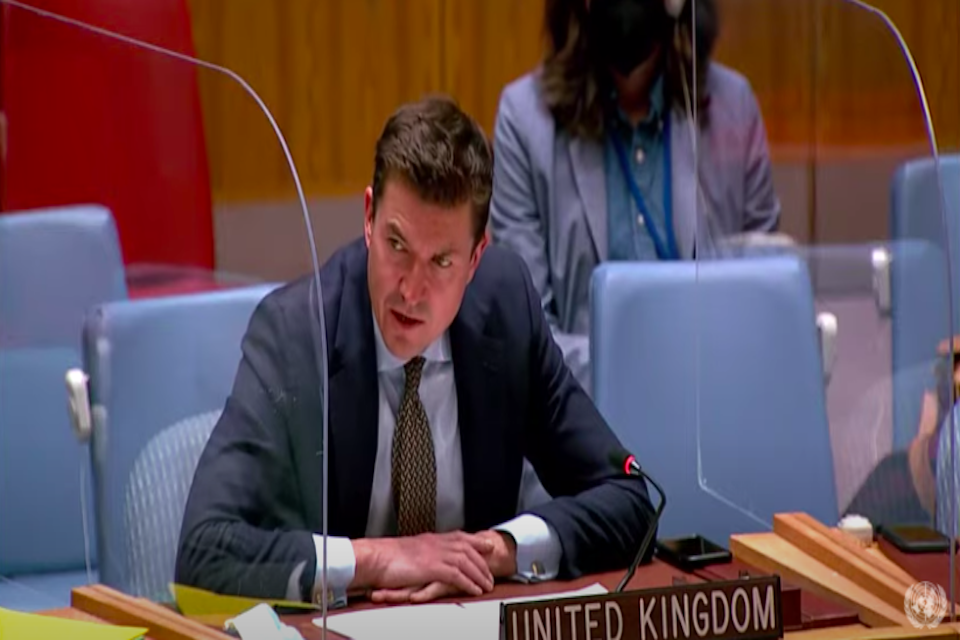Continued efforts to support and promote peace, stability and security in Central Africa
Statement by Ambassador James Roscoe at the Security Council briefing on the United Nations Regional Office for Central Africa

Thank you Mr President.
I want to begin by expressing our heartfelt thanks to SRSG Fall for his insightful briefing today and more significantly, for his continued efforts to support and promote peace, stability and security in Central Africa.
Mr President, your modesty will not appreciate this but I want to join him in his tribute to your in your own leadership, in your work on this Council and on these issues in this region.
In terms of the work of the office itself, we welcome in particular the collaboration between UNOCA and the recently established ECCAS Commission. I know that has been incredibly constructive for you SRSG Fall in the recent period. We are also very encouraged by the links between your office, UNOWAS and other major UN offices in the region.
As you have set out today SRSG Fall , Central Africa continues to face serious political, economic, humanitarian and security challenges.
It remains important that the countries of the region work together, and with the support of the UN, to strengthen regional peace and security, protect civilians in conflict, and promote human rights and resilient economic recovery.
In this regard, I commend UNOCA’s ongoing work on conflict prevention and particularly, your mediation efforts across Central Africa. Your work to highlight and support inclusive and meaningful dialogue in countries preparing for elections is particularly welcome, SRSG.
We welcome and encourage even greater coordination between UNOCA and UN country teams in the sub-region. I know that you are doing this and you are working to convene them but we think a particular focus on delivery of agreed plans and strategies could be incredibly helpful.
Mr President, turning to individual countries in the region, as the SRSG has just done, the United Kingdom would like to reiterate its support to Chad as it undergoes its transition to a civilian and constitutional rule.
The UK welcomes the positive steps towards this transition, including the appointment of a largely civilian cabinet and ongoing talks with armed opposition groups.
We encourage the government of Chad to continue to lead an inclusive process to facilitate a peaceful and successful political transition.
Mr President, the United Kingdom remains deeply concerned by the ongoing crisis and continued human rights violations in the North-West and South-West regions of Cameroon.
The impacts on civilians there continue to be profound.
The conflict in this region has driven around 650,000 people from their homes and forced almost 70,000 people to seek refuge in neighbouring Nigeria.
The continued closure of two thirds of schools, now for a fifth year, means 700,000 children are not receiving an education and we know what that means in terms of a driver of conflict.
The UK has allocated a further US$6m of humanitarian aid to Cameroon this year.
This funding will provide vital assistance, including food, medical supplies and sanitation provisions. What Cameroon desperately needs is the dialogue the SRSG has just spoken about and we hope you will do all you can to encourage that dialogue as we will.
Mr President, the United Kingdom also strongly condemns the terrorist attacks on civilians in Cameroon’s Far North, and across the wider Lake Chad Basin area.
We welcome the efforts of the Multi-National Joint Task Force to tackle Boko Haram and Islamic State West Africa in the region. We have also just heard how complex that situation is and we need to continue to focus on that.
The UK Government continues to support regional stabilisation efforts through our support to the regional stabilisation facility, working with international partners and regional governments.
Turning to Burundi, we welcome the efforts by the Government to re-engage with the international community and demonstrate a greater commitment to human rights.
To this end we continue to urge the Government of Burundi to engage with the UN human rights monitoring mechanisms, including the new Special Rapporteur for human rights, and to ensure that the needs and rights of refugees, other displaced people and host communities are recognised.
Mr President, the UK remains concerned about the ongoing violence in the Central African Republic, which continues to take a distressing toll on the civilian population, compounding an already acute humanitarian situation.
We commend President Touadera for his call for a unilateral ceasefire, and continue to underline the importance of an inclusive peace-building process.
We regret to hear further reports that the Russian private military company Wagner continues to commit human rights abuses in the Central African Republic.
The Wagner Group drive conflict and capitalise on instability for their own interests.
They do not offer long-term security answers in the Central African Republic or elsewhere in Africa, and undermine the work of international peacekeepers.
Mr President, if I may conclude by thanking SRSG Fall. We recognise the huge challenges across the region. We are grateful to you for your energetic and personal commitment to help guide the efforts of peace and stability in the region. We are fortunate to have you Sir.